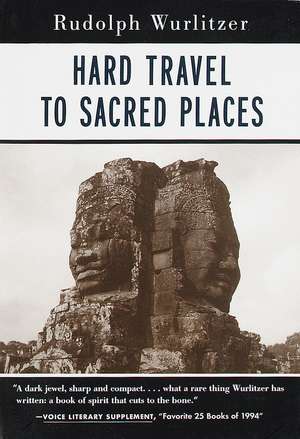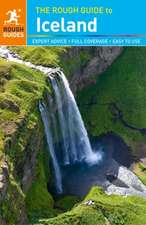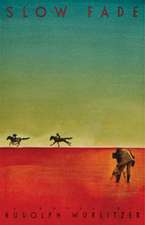Hard Travel to Sacred Places: The Education of an American Samurai
Autor Rudolph Wurlitzeren Limba Engleză Paperback – 31 aug 1995
Preț: 111.04 lei
Nou
Puncte Express: 167
Preț estimativ în valută:
21.25€ • 22.10$ • 17.54£
21.25€ • 22.10$ • 17.54£
Carte disponibilă
Livrare economică 25 martie-08 aprilie
Preluare comenzi: 021 569.72.76
Specificații
ISBN-13: 9781570621178
ISBN-10: 1570621179
Pagini: 176
Dimensiuni: 139 x 216 x 11 mm
Greutate: 0.22 kg
Editura: Shambhala
ISBN-10: 1570621179
Pagini: 176
Dimensiuni: 139 x 216 x 11 mm
Greutate: 0.22 kg
Editura: Shambhala
Notă biografică
Rudolph Wurlitzer is a screenwriter, novelist, and essayist. He wrote the screenplay for Little Buddha, directed by Bernardo Bertolucci. His short fiction and articles have appeared in Esquire, Atlantic Monthly, Saturday Evening Post, and Rolling Stone. His novel Nog is an underground classic.
Textul de pe ultima copertă
Hard Travel to Sacred Places is the record of a personal odyssey through Southeast Asia, an external and internal journey through grief and the painful realities of a decadent age. Wurlitzer - novelist, screenwriter, and Buddhist practitioner - travels with his wife, photographer Lynn Davis, on a photo assignment to the sacred sites of Thailand, Burma, and Cambodia. Heavy Westernization, sex clubs, aging hippies and expatriates, and political dissidents provide a vivid contrast to the peace that Wurlitzer and Davis seek, still reeling from the death of their son in a car accident. As Davis with her camera searches for a thread of meaning among the artifacts and relics of a more enlightened age, Wurlitzer grasps at the wisdom of the Buddhist teachings in an effort to assuage his grief. His journal chronicles the survival of age-old truths in a world gone mad.


